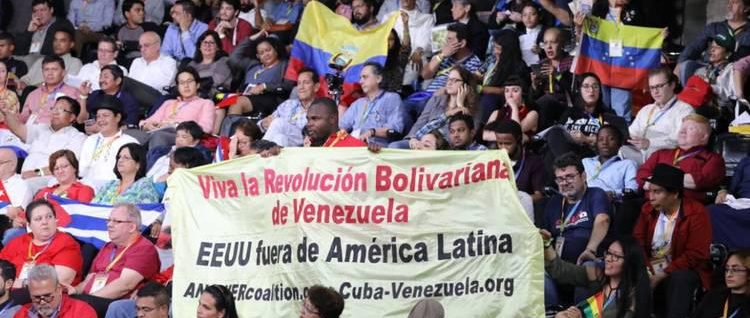
Venezuela has itself experienced multiple U.S.-backed coup attempts
On June 27, 2024, the Venezuelan government condemned the failed military coup attempt that sought to unseat Bolivia’s left-wing government.
Venezuela’s government has itself survived repeated coup attempts backed by the United States since the country’s Bolivarian Revolution in the late 1990s.
The major purpose of the latter revolution was to restore Venezuela’s economic sovereignty and combat poverty by using oil revenues from nationalized industry to institute social programs.
Anya Parampil is a reporter at the Grayzone and former RT News host who has published a new book examining U.S. regime-change operations in Venezuela over the past two decades.
The title of the book, Corporate Coup: Venezuela and the End of U.S. Empire, derives from the fact that U.S. corporate interests are driving regime-change operations.
The U.S. experienced a corporate coup d’état decades ago, leading to the institutionalization of neo-liberalism and imperialistic foreign policies.
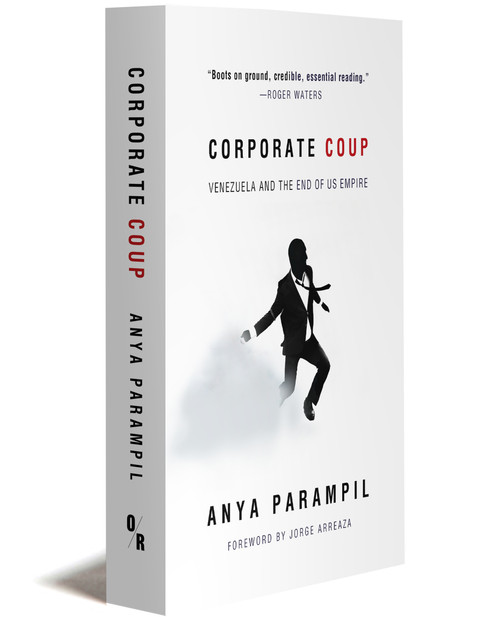

Parampil emphasizes that Venezuela’s socialism is based on the state’s ownership of Venezuela’s abundant natural riches, which include the largest crude oil reserves and untapped gold deposits in the world.
She writes that the campaign to “assert sovereign control of [Venezuela’s] natural wealth placed Caracas in direct confrontation with the foreign corporate interests that practically owned the country throughout previous decades. As a result, ever since the Bush II era, Washington’s sole interest in Caracas has been regime change.”[1]
The first U.S.-backed coup attempt launched against Hugo Chávez (1998-2013)—whose socialist government cut poverty by 20% and extreme poverty by 30%—sought to install a right-wing businessman, Pedro Carmona, who briefly took power while Chávez was held at a military base.[2]
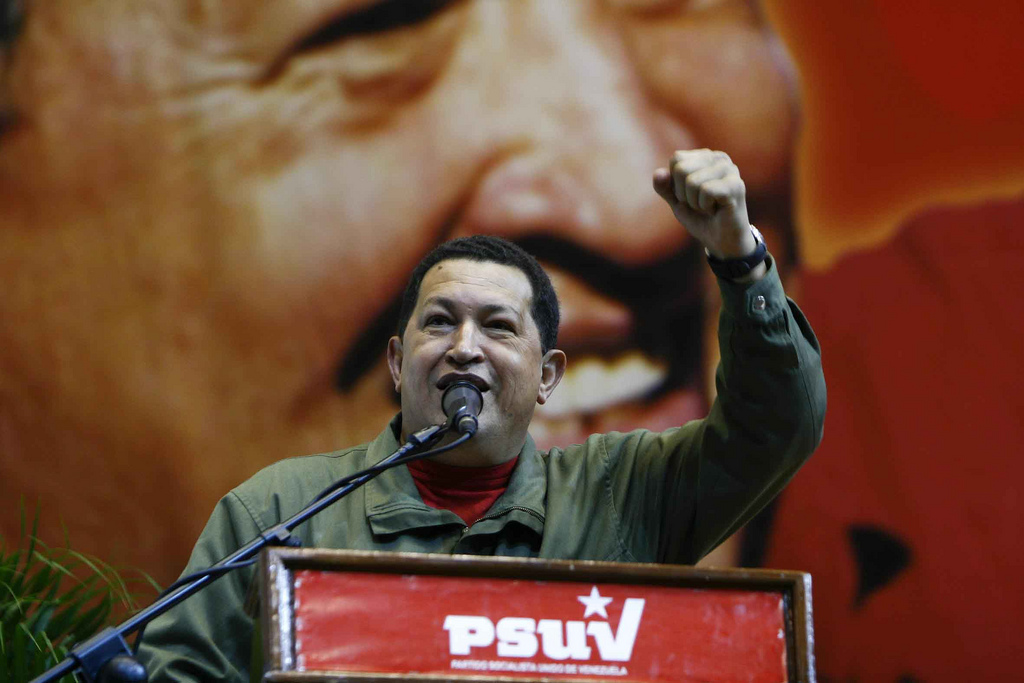
After Chávez’s death from cancer in 2013, Washington developed a plan to inspire an uprising in Venezuela’s military against Chavez’s replacement, Nicolás Maduro, by creating anarchy on the streets of Caracas.
Leading the way were Venezuelan opposition leaders who are today celebrated as pro-democracy champions by the National Endowment for Democracy (NED), Maria Corina Machado and Leopoldo López.[3]
They coordinated right-wing “Guarimbas” that vandalized government buildings and residences, ransacked public transportation hubs, barricaded major highways and assailed trucks transporting gas and food.
The campaign left behind billions of dollars in property damage, at least three dead, and hundreds more wounded.[4] WikiLeaks cables show that the U.S. was bankrolling many of the Guarimba movement’s leaders and that funding for such projects increased by 80 percent between 2012 and 2014.
López’s moment of glory occurred on February 12, 2014, when he delivered an impassioned speech directing his followers to march to the office of Venezuela’s Attorney General minutes before the mob was captured on video attempting to “burn the building to the ground.”[5]
According to Parampil, the event represented “a genuinely violent, foreign-backed insurrection that made the January 6 U.S. Capitol riot, an eternal source of trauma for Beltway liberals, look like a Macy’s Thanksgiving Day Parade.”[6]
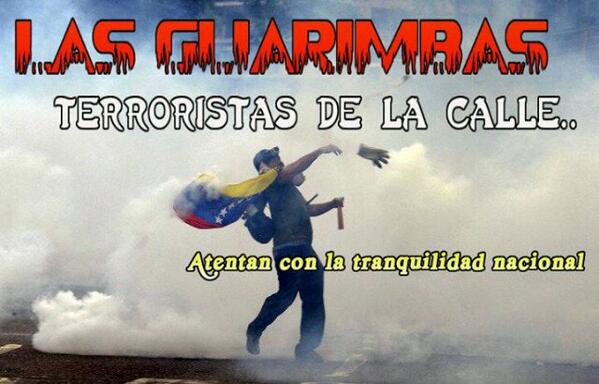
The Guarimba campaign, supported by the Obama administration, was followed by a fierce economic war that Parampil compares to a medieval siege.
The war included a) levying of extensive sanctions on Maduro’s government as crude oil prices plummeted; b) cutting off Venezuela from international credit lines as a result of Obama’s labeling Venezuela “an unusual and extraordinary threat to the National Security of the U.S.”; c) lobbying Riyadh to boost crude oil production and collapse the global market through the basic laws of supply and demand; and d) efforts to seize Venezuela’s foreign assets.[7]
Venezuela’s subsequent economic woes—which resulted in a 72% decline in living standards and 31% increase in mortality rates between the years 2017 and 2018 alone[8]—were blamed on the supposed failure of Chavismo and Venezuela’s socialist experiment.
According to Alfred de Zayas, one of the few UN officials to visit Venezuela, modern-day siege warfare was accompanied by the manipulation of public opinion through “fake news,” aggressive public relations and a pseudo-human rights rhetoric that ultimately reinforced Washington’s regime-change narrative the world over.[9]
In 2019, the Trump administration officially recognized Juan Guaidó, an opposition politician close with Leopoldo López who received NED training, as Venezuela’s leader even though he was largely unknown to the Venezuelan population.
Parampil notes that the step to recognize Guaidó—whom she calls an “imperial incubator baby”—was unprecedented as never before had the U.S. offered legal recognition to a new government before an actual change in leadership had taken place.
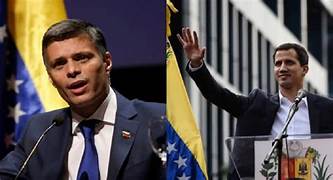
Trump’s Venezuelan policy was guided by super-hawks like John Bolton and Elliott Abrams, a CIA agent who was convicted for his role in protecting arms and drug-smuggling operations to Nicaraguan counter-revolutionaries and covered up U.S. support for large-scale war crimes in Guatemala and El Salvador in the 1980s.
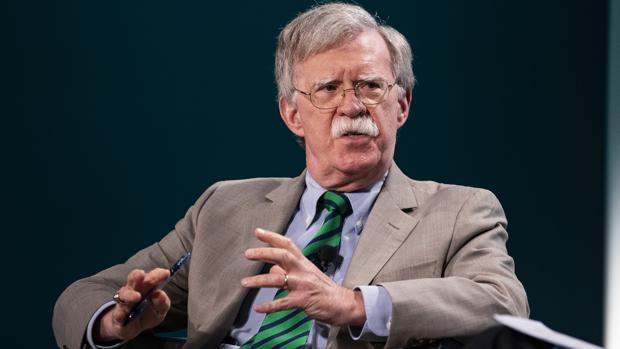
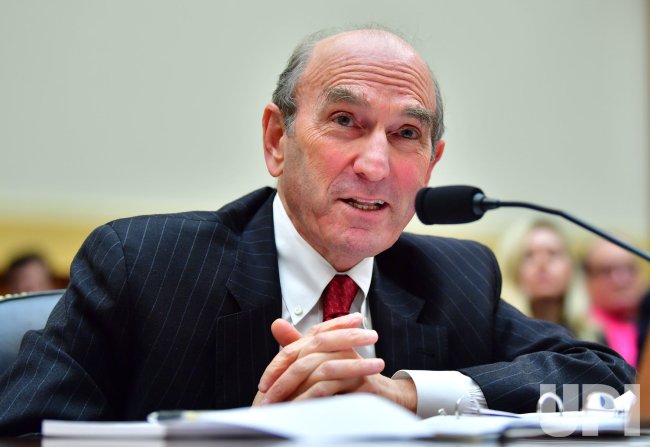
Trump himself in a campaign speech honored a Venezuelan law enforcement officer, Óscar Pérez, who during the 2014 Guarimba uprising, hijacked a police helicopter and launched grenades at Venezuela’s Justice Ministry.[10]
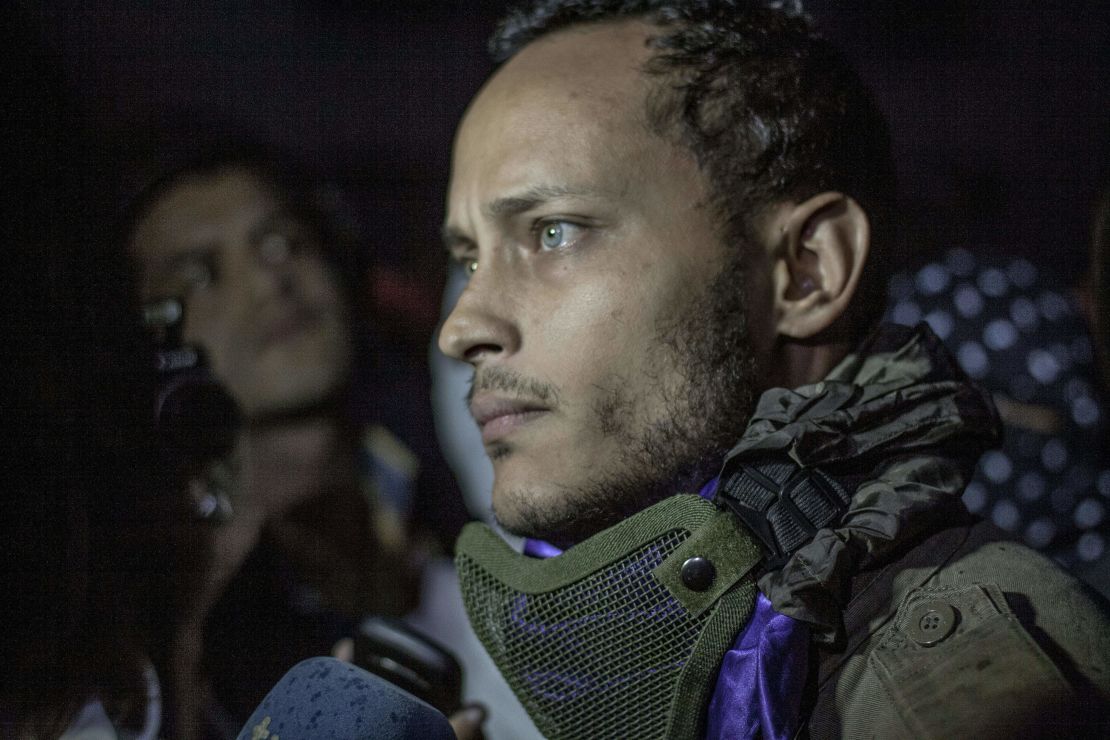
Allegedly Trump told Bolton that it would be really “cool” to take Venezuela because it is “really part of the United States.”
Bolton and others in the National Security Council advocated for carrying out waves of terror attacks on Venezuelan civilian infrastructure–something that sheds new light on several suspicious explosions, fires, blackouts and other mishaps inside Venezuela that Maduro had long blamed on the U.S
A former CIA operative around this time was arrested outside Venezuela’s largest oil refinery with a submachine gun, a grenade launcher, four blocks of C4 explosives, a satellite phone, and stacks of U.S. dollars.
In 2018, Maduro was the victim of a failed assassination attempt using drones, which Maduro blamed Bolton of masterminding.[11]
The venality of Guaidó and members of his entourage was apparent when money for a planned uprising staged along the Colombia border—to be financed from “humanitarian aid” provided by USAID under the rubric of refugee relief—was embezzled.[12]
Known locally as the “Bay of Piglets” in reference to the bungled CIA-directed invasion of Cuba in 1961, Operation Gideon was another foiled plot led by a former U.S. Green Beret, Jordan Goudreau, to capture and then kill Maduro.
Goudreau worked for a Florida-based mercenary company called Silvercorp USA, which was contracted to oversee training and weapons procurement for Operation Gideon.[13]
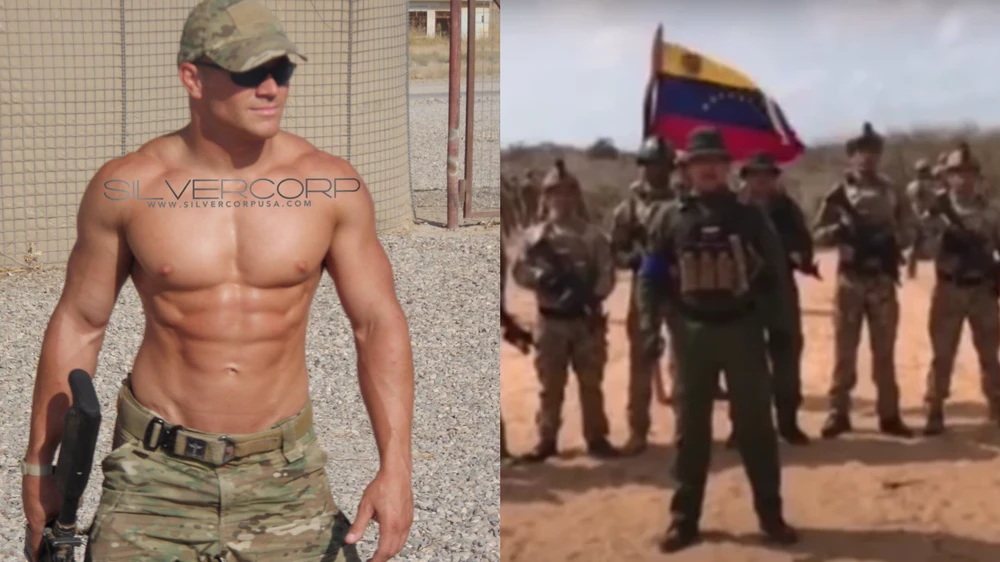
According to Parampil, while the CIA appears to have dissuaded Goudreau from going forward with the coup attempt, Guaidó and Leopoldo López, “the ringleader of Venezuela’s U.S.-backed opposition,” were briefed about it and gave the green light.[14]
The U.S. State Department and Trump’s National Security Council also supported the plot, with the State Department issuing a $15 million reward for Maduro’s arrest on fraudulent narcotics-trafficking charges.[15]
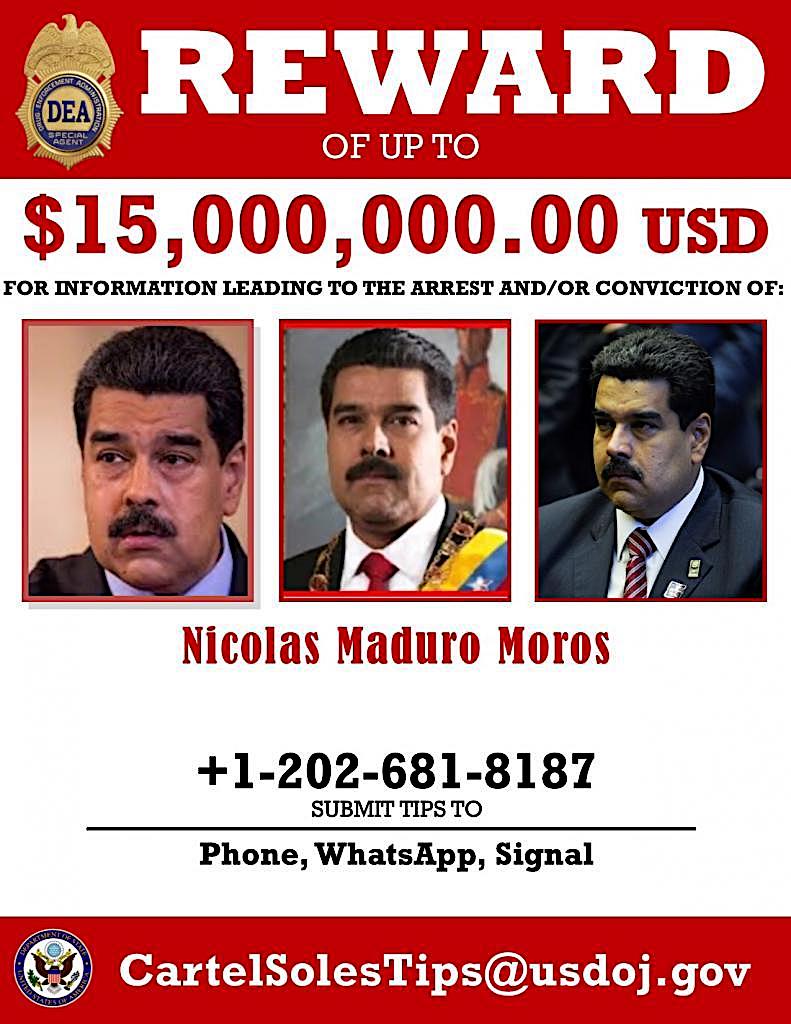
At the end of the day, Guaidó, López and Goudreau have functioned as musclemen for the Big Business/Wall Street efforts to reverse Venezuela’s Bolivarian Revolution.
This revolution has enabled Venezuela—at a steep price in light of the sanctions—to overcome the 20th century pattern of corporate pillage, and to establish connection to other countries seeking to escape the yoke of Western neo-colonialism.
On July 28, Venezuelans will go to the polls and likely vote Maduro back for another term—despite extensive U.S. backing of his rival, Edmundo González.[16]. The results will signify once again the failure of the corporate coup engineered in Washington that fits an ugly historical pattern.
Venezuela, according to Parampil, provides a model for other countries, like Bolivia, fighting to suppress the powerful forces that were behind Operation Gideon and 2014 Guarimba uprising, and may very well help lead the way to a new world order that is far more socially just than the last one.

-
Anya Parampil, with a foreword by Jorge Arreaza, Corporate Coup: Venezuela and the End of U.S. Empire (New York: OR Books 2024), xix. ↑
-
On the day of the coup, the U.S. Ambassador to Venezuela was present at the coup headquarters in Caracas, while U.S. Army and Navy units were also involved in the actions. After the coup’s failure, NED funding for the groups involved more than quadrupled, and the U.S. government opened up an “Office of Transitions” in Caracas to help plan future actions. ↑
-
After López’s arrest, the NED characterized him as a political prisoner. Alan Macleod reported that Machado—who supports a far-right program of mass privatization and laissez-faire economics in the model of Argentina’s Javier Milei—received direct financing from the NED. Since Venezuela’s 1998 Bolivarian revolution, the NED has poured millions of dollars into Venezuela to support opposition groups, financing anti-Chavez and Maduro media and activist networks. Macleod reported in Mint Press News that the NED’s latest published country report notes that it spent over $100,000 sponsoring a program called “Food Security and the Transition to Democracy,” which consisted of “foster[ing] a network of activists, intellectuals and citizens” who could act as leaders for a “democratic transition.” A second grant, this time for over $180,000, is designed to “enhance the leadership, organizational, and networking capacity of youth to engage in the recovery of democracy; and to foster international solidarity by raising the profiles and voices of youth leaders” –in other words, to train a generation of pro-U.S. political leaders to challenge and overthrow the government. ↑
-
Parampil, Corporate Coup, 19, 21. One of the Guarimba leaders, Nixon Moreno, led a crowd to lynch the governor of Merida state during the 2002 coup and was accused of murder and the rape of a police officer. ↑
-
Parampil, Corporate Coup, 20. ↑
-
Idem. ↑
-
Parampil, Corporate Coup, 28. Parampil notes, citing a Stratfor report, that oil revenue accounted for nearly 95% of Venezuelan exports by value, so the country was among the hardest hit by the fall of the price of oil. Some $2 billion in Venezuelan assets held at the Bank of England was frozen. ↑
-
Parampil, Corporate Coup, 34, 37. ↑
-
Parampil, Corporate Coup, 37. The indictment and extradition of Venezuelan diplomat Alex Saab was critical to maintaining Washington’s economic war on Venezuela because he was coordinating efforts with Venezuelan allies to offset the sanctions. ↑
-
Parampil, Corporate Coup, 99. ↑
-
Under the assassination plot, drones filled with explosives intended to attack Maduro at a public event. ↑
-
Parampil, Corporate Coup, 114, 115, 116. An internal U.S. government audit found that U.S. government resources “may have fallen into corrupt hands, revealing that though USAID spent two million taxpayer dollars ‘to purchase and transport’ the aid, it neglected to impose proper fraud controls on its distribution.” ↑
-
Parampil, Corporate Coup, 250, 251. By the time Operation Gideon ended, Venezuelan authorities had killed at least six of Goudreau’s troops and captured 47 more, including two U.S. citizens, Luke Denman and Airan Berry. ↑
-
Parampil, Corporate Coup, 263. Goudreau’s scheme fell apart at the first sign of resistance, as his forces were overpowered by members of a local fishing collective armed with nothing more than antiquated revolvers and fishing knives. ↑
-
Parampil, Corporate Coup, 271. The latter charges were manufactured by Attorney General William Barr, who had similarly designed the plan to use narcotics-trafficking charges as a pretext for the U.S. invasion of Panama in 1990 under Operation Just Cause. ↑
-
Alan Macleod suggests that Maria Corinna Machado, who is banned from holding public office in Venezuela, is the puppet pulling the strings behind González’ candidacy. The Biden administration, it should be noted, has reimposed a sanctions regime on Venezuela that is much harsher than what Trump imposed in 2017. ↑
CovertAction Magazine is made possible by subscriptions, orders and donations from readers like you.
Blow the Whistle on U.S. Imperialism
Click the whistle and donate
When you donate to CovertAction Magazine, you are supporting investigative journalism. Your contributions go directly to supporting the development, production, editing, and dissemination of the Magazine.
CovertAction Magazine does not receive corporate or government sponsorship. Yet, we hold a steadfast commitment to providing compensation for writers, editorial and technical support. Your support helps facilitate this compensation as well as increase the caliber of this work.
Please make a donation by clicking on the donate logo above and enter the amount and your credit or debit card information.
CovertAction Institute, Inc. (CAI) is a 501(c)(3) non-profit organization and your gift is tax-deductible for federal income purposes. CAI’s tax-exempt ID number is 87-2461683.
We sincerely thank you for your support.
Disclaimer: The contents of this article are the sole responsibility of the author(s). CovertAction Institute, Inc. (CAI), including its Board of Directors (BD), Editorial Board (EB), Advisory Board (AB), staff, volunteers and its projects (including CovertAction Magazine) are not responsible for any inaccurate or incorrect statement in this article. This article also does not necessarily represent the views the BD, the EB, the AB, staff, volunteers, or any members of its projects.
Differing viewpoints: CAM publishes articles with differing viewpoints in an effort to nurture vibrant debate and thoughtful critical analysis. Feel free to comment on the articles in the comment section and/or send your letters to the Editors, which we will publish in the Letters column.
Copyrighted Material: This web site may contain copyrighted material the use of which has not always been specifically authorized by the copyright owner. As a not-for-profit charitable organization incorporated in the State of New York, we are making such material available in an effort to advance the understanding of humanity’s problems and hopefully to help find solutions for those problems. We believe this constitutes a ‘fair use’ of any such copyrighted material as provided for in section 107 of the US Copyright Law. You can read more about ‘fair use’ and US Copyright Law at the Legal Information Institute of Cornell Law School.
Republishing: CovertAction Magazine (CAM) grants permission to cross-post CAM articles on not-for-profit community internet sites as long as the source is acknowledged together with a hyperlink to the original CovertAction Magazine article. Also, kindly let us know at info@CovertActionMagazine.com. For publication of CAM articles in print or other forms including commercial internet sites, contact: info@CovertActionMagazine.com.
By using this site, you agree to these terms above.
About the Author

Jeremy Kuzmarov holds a Ph.D. in American history from Brandeis University and has taught at numerous colleges across the United States. He is regularly sought out as an expert on U.S. history and politics for radio and TV programs and co-hosts a radio show on New York Public Radio and on Progressive Radio News Network called “Uncontrolled Opposition.”
He is Managing Editor of CovertAction Magazine and is the author of six books on U.S. foreign policy, including Obama’s Unending Wars (Clarity Press, 2019), The Russians Are Coming, Again, with John Marciano (Monthly Review Press, 2018), Warmonger. How Clinton’s Malign Foreign Policy Launched the U.S. Trajectory From Bush II to Biden (Clarity Press, 2023); and with Dan Kovalik, Syria: Anatomy of Regime Change (Baraka Books, 2025).
Besides these books, Kuzmarov has published hundreds of articles and contributed to numerous edited volumes, including one in the prestigious Oxford History of Counterinsurgency .
He can be reached at jkuzmarov2@gmail.com and found on substack here.

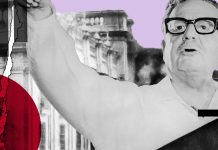
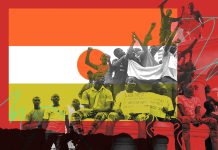
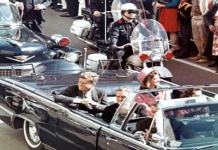
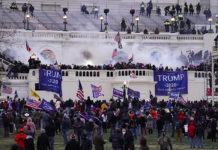
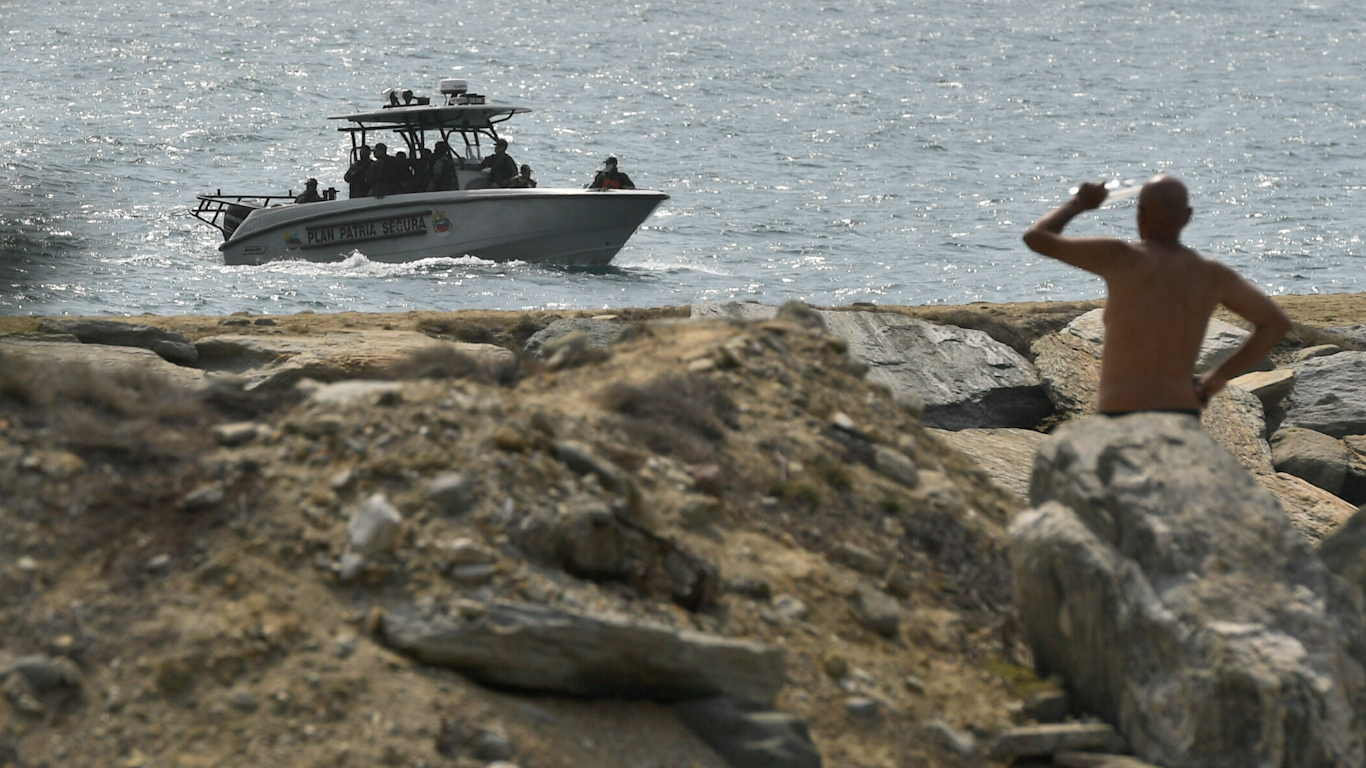
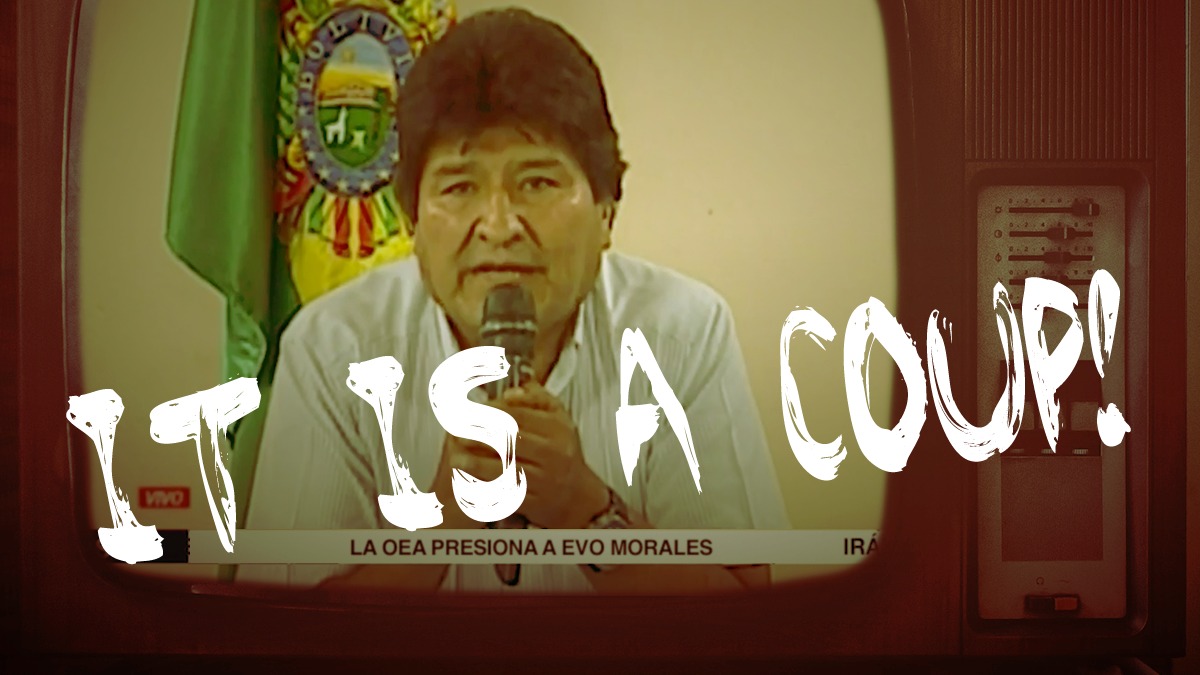

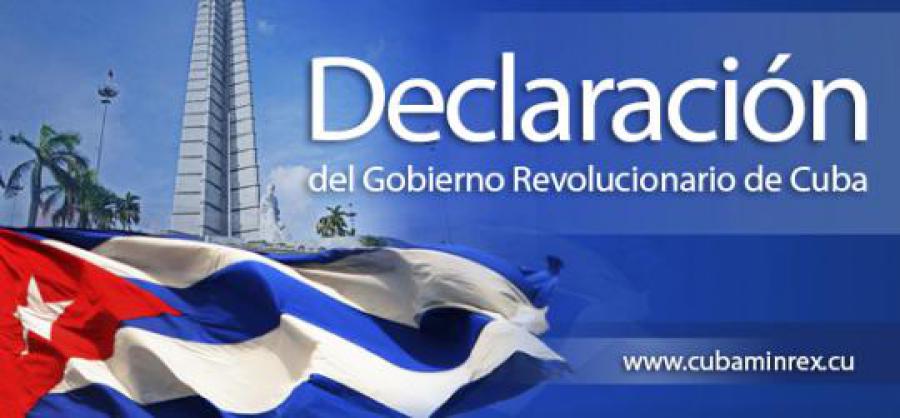


Excellent article, although Grayzone is the worst source of reliable information
https://api.newsguardtech.com/label/thegrayzone.com?cid=1ae62fb7-d344-4eb8-9180-b3ea6ab7e73f